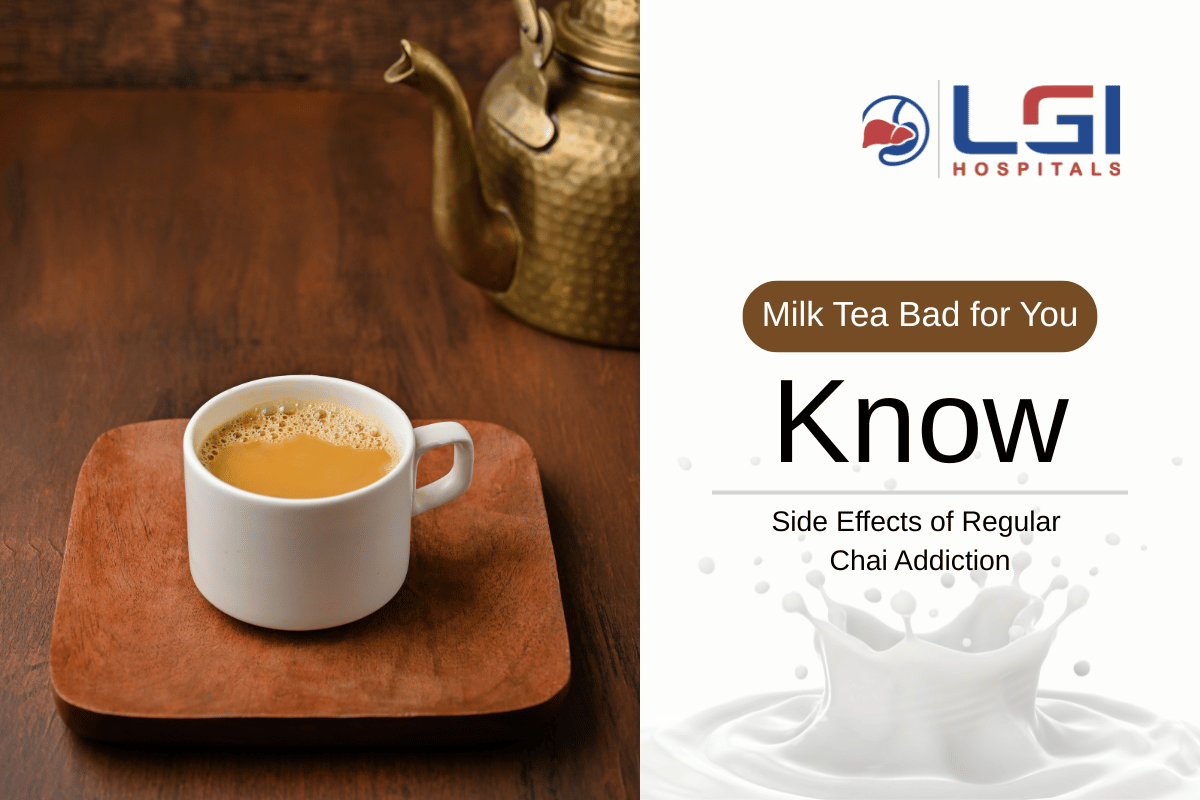For millions of Indians, milk tea (chai) is more than a drink—it’s an emotion. But with rising health concerns, many people now ask: “Is milk tea bad for you?” The truth is, while one or two cups may not cause harm, regular chai addiction can lead to several health issues.
In this blog, we’ll discuss the side effects of drinking milk tea daily, how it affects your body, and when you should consult a doctor.
Why People Develop Chai Addiction
It contains caffeine, sugar, and milk proteins, which make it addictive.
- Caffeine gives an instant energy boost.
- Sugar creates a comfort-craving loop.
- Spices and milk make chai soothing and flavorful.
Over time, this habit leads to chai addiction, where missing your daily cup makes you feel tired or irritated.
Common Side Effects of Drinking
1. Milk Tea and Acidity Problems
One of the most asked questions is: “Why does milk tea cause acidity?”
- It is acidic and can irritate the stomach lining.
- It may cause acid reflux, bloating, and gas, especially on an empty stomach.
If you often face acidity after chai, it’s a clear sign of overconsumption.
2. Is Milk Tea Bad for Iron Absorption?
Yes. The tannins in tea reduce the body’s ability to absorb iron from food.
- This can increase the risk of anemia and fatigue.
- Women and children should be extra cautious with regular chai addiction.
3. Chai Addiction and Sleep Problems
Drinking tea late in the evening can affect your sleep.
- Caffeine from milk tea stays in the body for 6–8 hours.
- It can cause insomnia, restlessness, or disturbed sleep cycles.
4. Headaches and Withdrawal Symptoms
Skipping tea after regular intake may cause:
- Headaches
- Irritability
- Fatigue
This is due to caffeine withdrawal, a sign of chai addiction.
5. Sugar and Weight Gain
Milk tea usually contains sugar, which can add empty calories.
- Excess sugar leads to weight gain.
- Regular chai drinkers may also face blood sugar spikes and a higher risk of diabetes.
6. Dehydration Risk
Milk tea works as a mild diuretic (increases urination). Too much chai without enough water may cause dehydration.
How Much Milk Tea is Safe?
- 1–2 cups per day is considered safe for most healthy adults.
- Avoid drinking chai on an empty stomach.
- Reduce sugar or switch to healthier alternatives.
- Don’t replace water with tea.
When to See a Doctor
If you notice these symptoms, consult a doctor immediately:
- Frequent acidity, bloating, or indigestion after drinking tea
- Low energy or anemia-like symptoms
- Sleep disturbances due to chai addiction
At LGI Hospital, our experts help patients manage digestive issues, acidity, and lifestyle problems caused by excessive tea consumption.
Key Takeaway
So, Milk tea bad for you?
In moderation, it is safe.
In excess, regular chai addiction can cause acidity, poor iron absorption, sleep issues, and more.
Your health depends on balance, not excess.
FAQs on Milk Tea Side Effects
Q1: Can milk tea cause acidity?
Yes, it is acidic and may lead to acidity and bloating, especially if consumed on an empty stomach.
Q2: Is milk tea harmful for the stomach?
Excess of it can irritate the stomach lining, cause indigestion, and affect gut health.
Q3: How many cups of milk tea are safe per day?
1–2 cups are safe for most adults. More than that may lead to health issues.
Q4: Does milk tea cause weight gain?
Yes, sweetened one contributes to excess calories and may cause weight gain over time.

